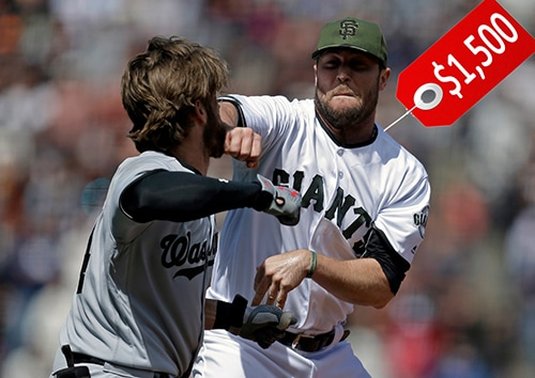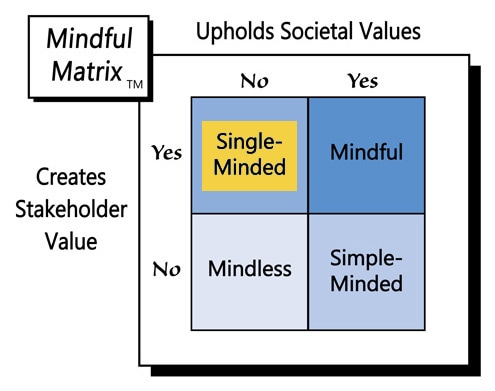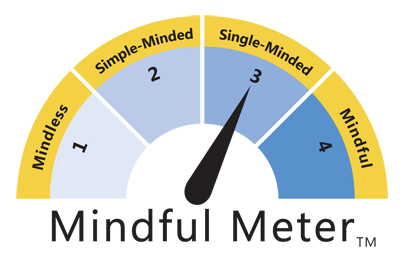Even if you don’t follow professional baseball, you may have heard of the brawl that broke out between the Washington Nationals and the San Francisco Giants this past Memorial Day. The clash occurred in the eighth inning when Giants relief pitcher Hunter Strickland pegged Bryce Harper in the hip with a fastball, which many believe was planned payback for Harper homering twice off Strickland in the 2014 playoffs.
Harper charged the mound, where the pair exchanged a few blows as the benches cleared and players from both teams enveloped the combatants. The altercation earned Harper and Strickland suspensions of four and six games, respectively, as well as fines of undisclosed amounts. So, MLB took a strong stance against fighting—well, not exactly.
A few days after the incident, the jersey that Strickland wore during the ruckus appeared for sale on the league’s dedicated auction website: http://auctions.mlb.com. The site, which is “The Official Online Auction of Major League Baseball,” offers to the highest bidder all matter of baseball memorabilia, ranging from Albert Pujols’s 585th career home run ball, to seats from Wrigley Field. MLB has a painstaking process for ensuring the authenticity of such collectibles, which includes employing an authenticator at every game who affixes a tamper-resistant, serial-number-linked holographic sticker to each item that may have special future value.
Somehow jersey #60 made its way off Strickland, through the authentication process, and onto the auction block. There the shirt quickly began collecting bids, which rose to $1,500, making it “by far the most coveted game-used Giants jersey” from the Memorial Day game. Those competing for the collectible were well aware of what they were after; in fact, “the item listing noted that ‘Strickland was ejected from the game after fighting with Bryce Harper.’”
Meanwhile a representative of MLB Auctions told the Washington Post that proceeds from the jersey’s sale would go to the Giants. The league also listed for sale Strickland’s Memorial Day cap and the shirt that Giants outfielder Michael Morse wore in the same game. Morse ended up on the seven-day concussion disabled list after the game because he hit heads with one of his own teammates, pitcher Jeff Samardzija, during the scuffle.
Successful businesses and businesspeople need to be opportunistic, right? They see chances to make money and they take advantage of them. So, was MLB just following best practices in realizing revenue from the Memorial Day merchandise? No.
The league’s sale of the memorabilia implied acceptance of the fighting. Principled organizations and individuals only market products that they feel are good and right. A firm that sells smartphones believes that the technology benefits its users. Even owners of preschool lemonade stands believe that their customers benefit from their beverages. In contrast, we question the integrity of individuals who sell products that they would never use themselves, although they could.
Some may argue that Strickland’s Memorial Day jersey is just a shirt, and that there’s nothing inherently violent about a piece of clothing. That’s true, but it’s also obvious that the jersey would never have been worth $1,500 aside from its unseemly association. As the seller, MLB intended to capture significant extra value because of the violence.
Our world is rightly enraged by violence that terrorists, abusive spouses, and school bullies act out on innocents. In comparison, major league players pummeling each other on a pitching mound seems less severe because they are highly paid elite athletes and baseball is entertainment, but the brutality is still very real.
As angry as individuals may be, belting someone with a baseball and throttling them with fists aren’t ways rational people resolve differences, and they certainly are not behaviors we want young people to emulate. Yet, selling shirts and other merchandise connected to such incidents legitimizes those actions and even glamorizes the violence.
Granted, there’s gratuitous violence in other sports that occurs even more frequently, e.g., the fighting that’s tolerated and even glorified in ice hockey, which is also problematic. That discussion, however, will need to wait for another blog post.
Fortunately, MLB realized the error of its way and closed the auction a couple of hours before it was scheduled to end. Still, the message had already been sent, and the perceptual damage had been done. Unfortunately, people will pay to partake in violence in various ways, but the organizations that stoop to satisfy such demand are guilty of “Single-Minded Marketing.”
Learn more about the Mindful Matrix and Mindful Meter.
Check out Mindful Marketing Ads and Vote your Mind!




 RSS Feed
RSS Feed